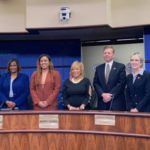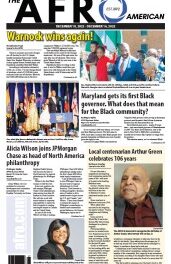By Ryan Michaels
The Birmingham Times
Birmingham city officials found a $53 million surplus in the FY 2020-2021 budget and will use more than $11.6 million to give city workers a 5 percent pay raise, a city council committee of the whole was told on Monday by city leaders.
Other expenditures from the surplus include $10 million for street paving; $7 million for trash bins; $3.745 million for Public Works rolling stock and $3 million to the World Games Foundation. Allocations for the raises total $11,630,975.
Of the total $53.4 million, $13.9 million remains.
The committee approved Mayor Woodfin’s proposal and the full committee will vote on Tuesday the immediate 5 percent cost of living adjustment (COLA) pay raise and a second 5 percent merit-based raise which will take effect on July 1, the start of the new fiscal year. The merit pay will be based on an employee’s start date and a supervisor evaluation.
The proposal also includes plans to cover a projected 10 percent increase in health insurance costs.
Council President Wardine Alexander said she supports any opportunity to help city employees “as well as residents of the city of Birmingham to have livable wages and attract qualified, competent staff by having a wage that they feel is livable, and that is commensurate with the work they do for the city.”
Alexander added that it’s also a perfect time to focus on public safety employees.
“We have police officers that are leaving the force after one or two years of training because they can go to municipalities that may offer more pay,” Alexander said.
The proposed pay increases come after a week of back-and-forth between some police advocates and City Hall, including a “disproportionate” number of officers calling in sick on Mar. 22.
City Council President Pro Tem Crystal Smitherman said the raises “show a good faith effort by the mayor’s office, and the city council” to help city employees.
“I think we do have to look at other options to help them out because there are other municipalities, smaller municipalities…that are paying more than the city of Birmingham.”
Councilor Carol Clarke said the city and surrounding municipalities are competing for the same workforce.
“I think we do have to find ways to take care of our people. They’re our most important asset and talent,” she said. “We’re competing now. I guess we always have been, but it seems more so than ever.”
Councilor Clinton Woods said the quality of city employees determines the “quality of the service that is being provided to citizens,” and the city has to make jobs worth their while for good employees to stay.
“Things come down to the compensation package, workplace environment, and just kind of overall quality of life, and so we want working for the city of Birmingham to be something that is sought after, that people want to work here, want to spend their career here, want to retire here,” Woods said.
Councilor Valerie Abbott said it’s important to retain good city employees because it keeps councilors from “having even more complaints than” they have now.
“The employees are the ones out there doing all the work. Everything that people call and ask us for requires an employee to do it, and we want to hang on to good people. We don’t want to lose them after we’ve got them all trained up,” Abbott said.
Councilor Darrell O’Quinn said even before the difficulty of recent years, Birmingham police, fire rescue and public works employees deserved additional compensation.
“All three of those are very critical to the functioning of municipal government, and we’ve had many challenges over the past couple of years, but even preceding that, they have been able to reliably and efficiently carry out the basic services that citizens demand,” he said.
Councilor Hunter Williams, previously chair of the Public Safety Committee, underscored the importance of police, fire and public works.
“[Public Works has] around-the-clock employees that work weekends and nights, just like our police and fire departments, and so it’s really important that we be able to compete, to both hire and retain employees,” Williams said.
Comparing Birmingham and the surrounding municipalities is “apples and oranges” and highlights why city workers should be among the highest paid, he said.
“Our 911 system has the largest number of 911 calls in the state of Alabama …We have a higher call volume than a lot of the surrounding municipalities for police, fire and square miles for public works to take care of,” he said.
In addition to salary increases, Councilor J.T. Moore said the city should support its employees in other ways.
“I think it’s very important that not only do we support them in giving them a raise, but really just trying to make sure that we show them and tell them how much we appreciate the work that they do and that they’ve been doing for a very long time because they do the things that a lot of people don’t want to do,” Moore said.











